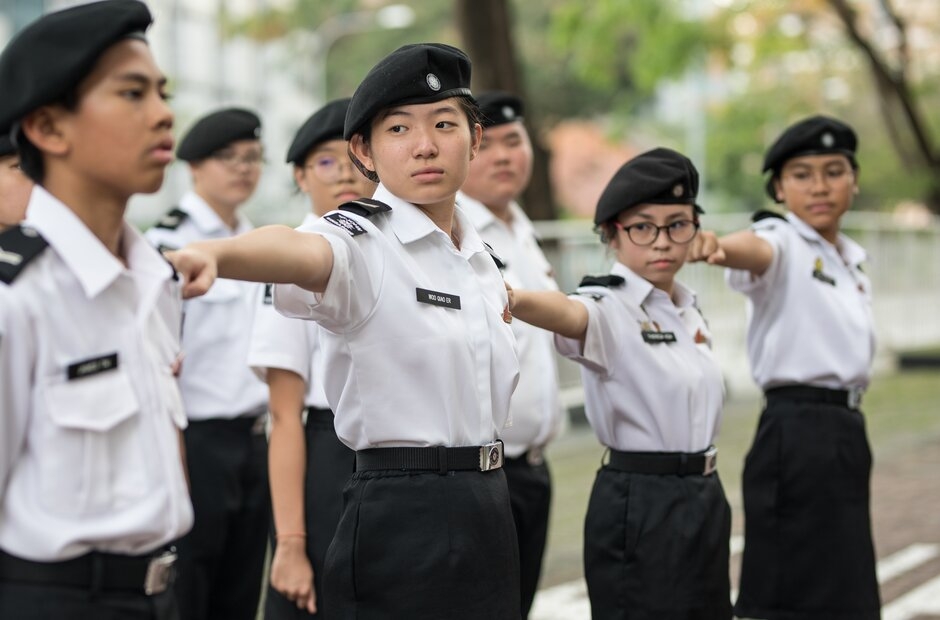Co-Curricular Activities (CCAs) play a critical role in the all-round development of students within Singapore’s school system. Among these, Uniformed Groups are particularly valued, aiming to cultivate discipline, teamwork, and leadership. This article offers a detailed look at Uniformed Group CCAs in Singapore’s primary and secondary schools, along with practical advice for parents on how to help their children prepare.
I. Overview of Uniformed Group CCAs in Singapore Primary and Secondary Schools
1. Uniformed Groups at the Primary Level
At the primary level, students who join Uniformed Groups will be introduced to basic disciplinary and team-focused activities. These programs are well-suited for building self-discipline and a sense of responsibility.
Common Primary-Level Uniformed Groups:
- Boys’ Brigade (BB)
Founded on Christian values, the Boys’ Brigade focuses on character and leadership development. Activities teach teamwork, camping skills, and community service. - Cub Scouts
Part of the worldwide Scout movement, Cub Scouts emphasize outdoor survival skills, cooperation, and personal growth. They cater to children aged 7–12. - Red Cross Youth
Centered on first aid training, community involvement, and humanitarian values. - Brownies
A uniformed group specifically for primary-aged girls, featuring crafts, adventure, and community service.
Key Characteristics of Primary-Level Uniformed Groups:
- Activities are relatively basic, highlighting fun and participation.
- Emphasis on building team spirit, basic etiquette, and a sense of responsibility.
- Engagement often involves hands-on, enjoyable activities (crafts, games, outdoor exploration).
2. Uniformed Groups at the Secondary Level
By secondary school, Uniformed Groups become more formal and rigorous. Students shoulder greater responsibilities and have opportunities to develop leadership skills.
Common Secondary-Level Uniformed Groups:
- National Police Cadet Corps (NPCC)
Students acquire skills related to police work, such as neighborhood patrolling, fitness drills, and a basic introduction to legal knowledge. - National Civil Defence Cadet Corps (NCDCC)
Focuses on first aid, firefighting skills, and emergency-response training, preparing students to handle crises. - Air Scouts and Sea Scouts
These branches highlight aviation and maritime knowledge respectively, including flight simulations, sailing, and navigation activities. - National Cadet Corps (NCC)
A military-themed group that teaches fundamental military drills, leadership abilities, and national defense awareness. - St. John Brigade
Primarily deals with healthcare and first aid. Students receive medical training and participate in community health services.
Key Characteristics of Secondary-Level Uniformed Groups:
- More demanding curriculum, centered on skill application and leadership training.
- Strict discipline and structured training sessions.
- Opportunities to join national events (e.g., National Day celebrations) or skill competitions.
II. Benefits of Uniformed Group CCAs
- Cultivating Discipline and Self-Management
- Adherence to strict rules and routines fosters self-control, time management, and task execution skills.
- Teamwork and Leadership
- Students learn to collaborate while also developing leadership skills through roles like cadet leader or squad commander.
- Improving Physical and Emotional Resilience
- Physical drills and outdoor activities (e.g., camping) boost fitness and help students handle challenges more confidently.
- Promoting Social Responsibility
- Many uniformed groups emphasize volunteer work and community engagement, instilling a sense of giving back to society.
- Boosting Admission Chances
- Excellent performance can yield bonus points or direct school admissions (DSA), helpful for securing places in top secondary schools or universities.
III. Preparing Your Child for Uniformed Group CCAs
To help a child successfully join and adapt to Uniformed Group CCAs, parents can focus on the following:
- Building Fundamental Interest
- Explain the Purpose: Discuss different groups and their core missions, helping children decide which interest them most.
- Preview Similar Activities: Consider community adventure programs or volunteering so children can sample relevant experiences.
- Enhancing Physical Fitness and Skills
- Boost Physical Conditioning: Uniformed groups require a certain level of fitness—encourage running, swimming, or sports.
- Acquire Relevant Skills: Skills like basic first aid, crafting, or rudimentary outdoor survival are often central to these CCAs.
- Developing Soft Skills
- Team Spirit: Engage your child in family projects or group games to underscore the value of cooperation.
- Time Management: Guide them in crafting schedules to balance schoolwork and CCA commitments.
- Participating in School Activities
- CCA Open House: Schools frequently organize events where students can explore various CCAs up close.
- Talk to Seniors: Learning from peers already in Uniformed Groups reveals the reality of daily activities and expectations.
- Supporting Their Choice
- Encourage Self-Selection: Let children select the group they find most appealing.
- Offer Ongoing Help: Provide moral support, solve problems, and motivate them to persist despite difficulties.
IV. Overcoming Challenges
- Strict Discipline
- Children new to Uniformed Groups may struggle with rigorous rules at first. Parents can ease the transition by explaining why discipline is vital.
- Physical Fatigue
- Training can be intense. Balanced meals, adequate rest, and hydration can help children cope with physical demands.
- Time Management
- Work together to create a schedule that balances academic tasks with CCA activities, ensuring neither is neglected.
- Psychological Stress
- Children might feel pressured by leadership roles or group goals. Parents can help by listening to their concerns and offering constructive reassurance.
V. Achieving Long-Term Benefits
- Developing Career Interests
- Experiencing Uniformed Groups may inspire passion for careers in policing, medicine, military service, etc.
- Building Social Networks
- Friendships forged in these groups can become meaningful support systems later in life.
- Enhancing Academic Competitiveness
- A strong track record in Uniformed Groups can give a boost to school applications or scholarship prospects.
- Acquiring Lifelong Skills
- First aid, leadership, and communication abilities gained in these CCAs benefit children well beyond school.
By exploring the various Uniformed Group CCAs at both primary and secondary levels and understanding how to support children, parents can help instill discipline, collaboration, and leadership skills essential for success in school and in life.
